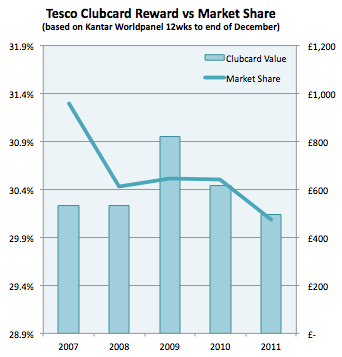
In the last couple of months, two new massive loyalty initiatives have been launched - and nobody really noticed.
Together they cover over 16 billion purchases and almost 1 billion people. They come from two of the largest brands in the world, one of which is rated number 8 in the top 100 Best Brands for 2011.
It's probably no real guess that these two brands are Facebook and Apple. However, what might be harder to pinpoint is the loyalty initiatives that they have launched.
Loyalty doesn't always have to mean points = prizes. Instead, loyalty can be defined as
Any activity or treatment that gets customers to make ongoing choices in your favour, all things being equal
Using this definition, I think you can define Facebook Timeline and Apple iTunes Match as loyalty initiaitves and here's why.
Facebook Timeline - For those that haven't noticed, Facebook is changing your profile page so that your whole life (or at least from when you started using Facebook) is laid out for you in one long timeline. You can go back to any year, month or day and see the comments you made, the pictures you've shared or the videos you uploaded.
It's presented in a really engaging way and once you get over the initial privacy concerns, it's really interesting to see and explore, especially if you've been on Facebook for a few years.
So why do I think this is a loyalty initiative?
This solution creates loyalty because they have essentially taken your existing information and created a context around it, something only they can do. Within Google+ I can re-create my relationships or re-upload my photos, but this doesn't re-create the context. Only Facebook knows when those online relationships were first created, what was said and where I was when I said it, where that photo was taken and where I was when it was taken.
This is being further extended with applications that will allow me to track activities such as how many miles I've run, the movies I've watched, the news I'm reading or the music i'm listening to; leaning towards the trend of self-tracking. These applications are also automatic, sharing on my timeline as I do them.
Facebook CEO and founder, Mark Zuckerberg described timeline as:-
"Real-time serendipity in a friction-less experience"
This use of the word "friction" is really interesting. In the book "The Loyalty Effect" by Frederick F. Reichheld, he says:-
Just as friction steals the energy from a mechanical system, defection steals the energy and knowledge from a business system. [..] The opportunity to reduce friction in most businesses is immense"
By making it easier to share my information and activities; by taking my own data and creating a context around it, Facebook have suddenly created something useful, desirable and importantly, frictionless.
Previously my profile was just a collection of the last few days of my thoughts and "likes"; something easily replicable on any other social network. Now my profile is everything I've done or am doing - all my interactions (or at least those shared) - ever.
Now, given the choice to do an activity like upload a photo, I'm more likely to choose Facebook, even though Google+ is equally capable. When adding a friend I'm more likely to add them on Facebook as that's where "I" am.
That preference is loyalty. Facebook Timeline is a frictionless loyalty initiative.
Apple iTunes Match - So I spent a lot of time over Christmas ripping all my CD collection onto my mac. Those that have previously done that will know it's not something you really want to do again.
The reason I did finally do it though was for one thing - iTunes Match.
Now, using iTunes Match, I'm able to let Apple see my whole music collection and to simply (and almost magically), make it available via the cloud, to every Apple device I own - forever.
Tim Cook, Apple CEO is quoted as saying about their overall cloud strategy:-
"I see it as a fundamental shift [..], it is not just a product. It is a strategy for the next decade"
By letting me upload my music collection I become less attached to the physical product - the CD or the download - and view iTunes more as a streaming service. The clever bit though is it's streaming my content to every Apple device I own. Using content that I already own and content that I'm attached to Apple have managed to create a strong and ongoing relationship by making it available on all of my devices in a truly frictionless way.
It's no surprise then that the overall Apple iCloud initiative has been described as:-
As close to seamless and frictionless synchronicity as we have been able to come to thus far.
They have turned their music store inside out and let me put my own product on the shelves. Now it's not a store but a repository - it's an extension of my own property and something I can share easily across all the (Apple) devices I own. (It's no surprise I've gone from zero Apple products to over 7 in less than 2 years!)
Now that they have the thousands of tracks I already own, I'm more likely to buy my next track from them, even though Amazon is equally capable. Even though I love the new Kindle Fire (and it is a fantastic little device), I'm more likely to buy the next iPad to keep easy and seamless access to my music.
That preference is loyalty. iTunes Match is a frictionless loyalty initiative.
Finding ways of making it easier for your customers to do business with you, of reducing friction, can be a really powerful loyalty driver.
With brands like Facebook and Apple finding increasing challenges to their dominant positions (think Kindle Fire / Android / Google+), these kinds of initiatives do really provide a competitive advantage and help their customers make ongoing choices in their favour.
That's what i'd call loyalty.
